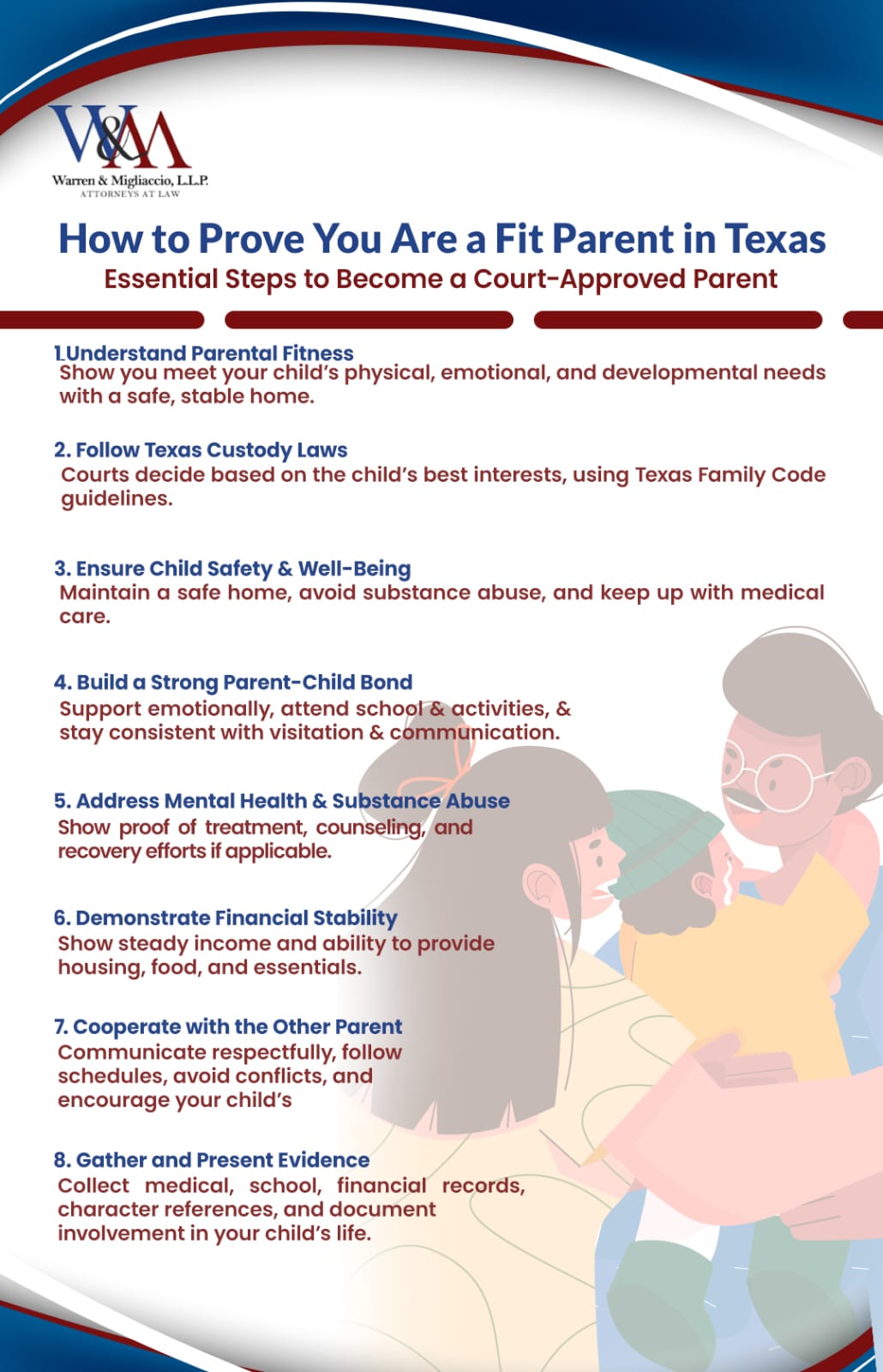When it comes to child custody cases in Texas, the stakes are high. As a family law attorney who has handled hundreds of custody cases statewide, I’ve seen how these cases can impact everyone involved.
Texas courts base custody decisions on the child’s best interests and parental fitness is a big part of that. Whether you’re going through a divorce, a modification or responding to claims about your parenting, you need to know how to show you’re a fit parent.
In this guide I’ll share practical steps to protect your parental rights and prove your fitness as a parent in Texas courts.
Key Takeaways
Texas courts base custody decisions on the child’s best interests and parental fitness is a big part of that.
In Texas family courts, parental fitness means you can meet your child’s physical, emotional and developmental needs.
Texas judges start with the idea that both parents should be part of the child’s life.
Courts view parents more favorably when they are consistent in their involvement in the child’s life, follow routines, show up for important events and provide steady emotional support.
Building a strong case starts with thorough records.
Parental Fitness and the Best Interests of the Child in Texas
What is Parental Fitness?
In Texas family courts, parental fitness refers to a parent’s ability to meet their child’s physical, emotional, and developmental needs. A fit parent provides a safe environment, makes sound decisions, and supports the child’s overall well-being. Additionally, child welfare agencies often play a significant role in evaluating whether a parent can provide a safe and nurturing environment.
On the other hand, being deemed unfit usually involves behaviors that put a child’s welfare at risk. This can include substance abuse, untreated mental health issues, or neglect. For example, in one case, I represented a father whose ex-spouse accused him of being an unfit parent simply because he worked long hours. However, we demonstrated to the court that he had reliable childcare in place and remained actively involved in his child’s life whenever he was off work. Ultimately, we proved that having a demanding job does not automatically make someone an unfit parent. Courts carefully weigh allegations of unfitness against the child’s best interest in maintaining a relationship with both parents.
Furthermore, Texas courts place a strong emphasis on consistency. They tend to view parents more favorably when they are consistently involved in their child’s life, maintain routines, attend important events, and offer steady emotional support.
Legal Framework for Parental Fitness in Texas
Chapters 153 and 161 of the Texas Family Code govern custody and parental rights. These laws give judges broad discretion to evaluate the best interests of the child including each parent’s parental fitness.
Texas judges start with the idea that both parents should be part of the child’s life. They only move away from that if there’s clear evidence it would harm the child or show one parent is unfit. In those cases court documents are key to evaluating parental fitness.
Courts use the “best interests of the child” standard and look at several factors including:
- The child’s physical and emotional needs* Each parent’s resources and abilities
- How stable each home is
- Any family violence or substance abuse
- The child’s preference (if they are 12 or older)
- Each parent’s willingness to support the child’s relationship with the other parent
Necessary documentation is required to support any allegations of unfit parenting. This documentation may include police reports, photographs and medical files which are critical for the court to evaluate the child’s safety and the parent’s ability to provide a stable environment.

Case Study: The Presumption of a Fit Parent’s Rights
In In re C.J.C., 603 S.W.3d 804 (Tex. 2020), the Texas Supreme Court dealt with a custody fight. The dispute was between a deceased child’s mother’s fiancé and the child’s biological father.
The Court ruled in favor of the biological father. It emphasized that Texas law assumes a fit parent acts in the best interest of their child. The law also protects a fit parent’s fundamental right to make decisions about their child’s care.
This decision is important because it strongly supports parental rights. It protects fit parents against challenges from non-parents. The ruling highlights the constitutional protections given to fit parents.
Key Factors Texas Courts Consider When Determining Parental Fitness
Ensuring the Child’s Safety and Well-Being
One key to proving fitness is giving your child a safe environment. Texas courts check if your home is free from danger, violence, or emotional abuse. Children’s safety is a crucial factor in custody proceedings, and courts prioritize maintaining it when assessing parental fitness. If you have alcohol abuse or drug problems, the court will want proof of your recovery, such as program completion, clean drug tests, or letters from counselors.
Medical records also show the court you’re caring for your child’s health. Keep track of doctor visits, dental care, and any treatments. Ensuring the child’s welfare is a priority in legal issues related to parental fitness. This helps confirm you pay attention to your child’s physical well-being.
Building a Strong Parent-Child Relationship
Courts look for a warm and supportive parent-child bond. They appreciate evidence that you:
- Show emotional support
- Help with homework
- Get involved in extracurricular activities
- Meet everyday care needs Being an involved parent is key to proving your fitness for custody.
If you don’t have primary custody stay consistent with visitation schedules and communication. Being involved in the child’s life is good for the child’s overall well-being. I once represented a mother who lived two hours away but visited every weekend and used video calls during the week to stay in touch. Because she stayed involved she later got broader custody rights.
The Data Behind Parental Involvement
When Texas courts evaluate parental fitness, they closely examine the level of each parent’s engagement in the child’s life. The impact of active parental participation isn’t just anecdotal; it’s backed by significant research. For instance, children with highly involved fathers were 43 percent more likely than children with less involved residential fathers to have earned mostly A’s [National Center for Education Statistics, U.S. Department of Education].
Addressing Mental Health Issues and Substance Abuse
Mental health issues don’t automatically make you an unfit parent. In fact, many parents manage their conditions and still take good care of their children.
That said, mental illness can influence custody decisions—particularly if it threatens the child’s welfare. Therefore, it’s crucial to manage your condition effectively and receive regular medical treatment. Additionally, keep records that demonstrate your commitment, such as proof of therapy attendance or ongoing treatment.

If you struggle with substance abuse, it’s essential to show that you’ve actively sought help. Courts typically look for evidence such as:
- Negative drug tests
- Treatment completion certificates
- Documentation showing continued participation in a treatment program
Substance abuse can make a parent unfit in the eyes of the court and may severely impact your ability to care for your child.
Moreover, be prepared for court-ordered psychological evaluations. These are usually conducted by social workers or mental health professionals who will assess your parenting abilities and emotional stability.
Financial Stability and Providing for the Child
You don’t have to be rich to be a fit parent but courts do want to see you can meet your child’s basic needs. Show:
- A steady work history or reliable income
- Acceptable housing that fits the child’s needs
- Ability to pay for food, clothing and essentials
- Good financial management
- Timely payment of child support
Courts understand you can be fit without being rich. What matters is using the resources you have to take care of your child.
Cooperation and Communication with the Other Parent
Your willingness to work with the other parent also matters. Even if a parent is deemed unfit they are still expected to fulfill certain parenting responsibilities. Courts favor parents who:
- Support schedules that benefit the child
- Speak nicely about parenting concerns
- Don’t drag the child into parental conflicts
- Follow court orders
- Encourage the child’s relationship with the other parent
I’ve noticed that parents who keep records of their efforts to work with the other parent even under stress tend to do better in child custody cases. Courts prioritize the child’s best interests which usually includes maintaining a relationship with both parents unless there are significant concerns regarding safety or fitness.
How to Prove You’re a Fit Parent in a Texas Child Custody Case — Step-by-Step
Gather Solid Evidence and Documentation
Building a strong case starts with thorough records. We recommend collecting:
- Police reports if there were any domestic violence incidents or dangerous situations
- Medical and school records showing your involvement in your child’s health and education
- Character reference letters from teachers, neighbors, clergy or friends who can vouch for you as a good parent
- Financial records such as pay stubs, tax returns and proofs of housing
- Supporting documentation to substantiate claims of fitness such as photographs and additional evidence
These items give the court a clear view of how you care for your child. Court documents are key in custody evaluations providing valuable insight for the judge to make a decision.
Present Evidence of Your Involvement in the Child’s Life
Show the court you’re in your child’s world:
- Prepare a parenting plan that covers major decisions about education, healthcare and other needs
- Keep logs of visits, phone calls and messages
- Document school meetings, doctor appointments and extracurricular events you attend
- Use photos or videos from important moments to show your presence in the child’s life. Being involved in various aspects of your child’s life shows you care about their well-being.
In one recent case we created a timeline with pictures of a parent at dance recitals, doctor visits and school events over two years. This visual proof was very helpful in court. Being an involved parent shows you care.
Address Potential Concerns or Red Flags
Courts like parents who own up to issues and show they’re fixing them. Addressing issues through rehabilitation programs can improve parenting capabilities. You may have:
- Documentation of counseling for mental health concerns
- Certificates from parenting or anger management classes
- Proof of rehab from substance abuse
- Explanation of how past legal troubles have been resolved
Child Welfare Services may set up safety plans if a parent is deemed unfit. Following these plans and showing you’ve turned things around can help rebuild trust with the court. Addressing concerns can prevent a parent from being deemed unfit.
Leverage Support from Professionals
Professional input can really help your case. Consider asking for support from:
- Social workers who know your family’s situation
- Therapists or counselors who have worked with you or your child
- Teachers or coaches who can speak about your involvement
- Finally, child welfare professionals who have inspected your home
Work with these professionals calmly and openly. Their reports often carry a lot of weight with the judge.
Prepare Well for Court Appearances
How you act in court can impact the judge’s view of you. We usually suggest clients:
- Dress neatly and modestly
- Speak respectfully to the judge, court staff and the other parent
- Stay calm even if the other parent makes upsetting claims
- Focus on the child’s needs not personal complaints
- Lastly, answer questions honestly and keep your records organized
Bringing labeled documents and presenting them logically helps you look prepared and responsible.

More Tips to Help Your Case
- Firstly, keep detailed records of your child’s schedule, school performance and medical care.
- Also, don’t argue with the other parent in front of the child or through written messages that can be used against you.
- Additionally, encourage the child’s relationship with the other parent if it’s safe to do so. Judges like to see you promote healthy family connections.
- Likewise, get outside help when needed, such as parenting classes or therapy. Courts often view this as a sign of responsibility.
- Finally, stay informed about local rules. Each court has slightly different rules or procedures that can impact your custody case.
Related: What Should You Not Do During a Custody Battle in Texas?
What kind of evidence will prove I am a fit parent?
Medical records, school reports, parenting journal, photos/videos of your involvement, character reference letters. Documentation of consistent care and a positive relationship is key. Providing necessary supporting documentation to back up claims of fitness is crucial in custody cases.
Here is a checklist to help you gather evidence for your custody battle: Verifiable documentation is key in custody disputes to ensure all claims are supported by tangible evidence.
| Category of Evidence | Specific Documents/Items | Why It’s Important |
|---|---|---|
| Child’s Well-being | Medical records, dental records, school reports, therapist reports (if applicable) | Shows attention to child’s physical and emotional health, and educational progress |
| Your Parenting Involvement | Parenting journal, photos/videos of activities, attendance logs for school/extracurricular events, communication logs | Documents active role, quality time, and consistent presence in child’s life |
| Financial Stability | Pay stubs, tax returns, bank statements, proof of housing (lease/mortgage) | Proves parent’s ability to provide basic necessities and a stable home |
| Home Environment | Photos/videos of child’s living space, safety measures in place | Demonstrates a safe, clean, and appropriate living environment for the child |
| Co-Parenting Efforts | Text message/email logs with co-parent, co-parenting app records, agreed-upon visitation schedule modifications | Shows willingness to cooperate and foster child’s relationship with other parent |
| Addressing Concerns | Certificates from parenting classes, therapy records, proof of rehabilitation (if applicable), criminal records (if clear) | Demonstrates proactivity in addressing potential issues and self-improvement |
Frequently Asked Questions
Understanding Texas “Fit Parent” Standard
What does Texas consider a “fit parent”?
A fit parent in Texas shows the parent’s ability to meet the child’s best interest by providing steady housing, consistent care, and protecting the physical well-being of a child. Courts look at things like medical records, a positive relationship with the child, and no major criminal issues or alcohol abuse.
Firstly, provide proof you’re involved in healthcare and school decisions.
Likewise, follow a visitation schedule if you’re not the custodial parent.
Additionally, document how you encourage the child’s bond with the child’s other parent.
How do Texas courts determine the “best interest of the child”?
Judges in Texas look at several factors, like how stable a custody arrangement is, how well the parents cooperate, and whether the child is safe. They also consider medical records, family court history, and the parent’s ability to meet emotional needs.
Courts review:
Firstly, home environment and safety
Likewise, custody evaluation findings
Thirdly, compliance with custody orders
Lastly, the child’s preference if they’re at least
Evidence & Proof
What evidence proves parental fitness in a custody battle?
Strong evidence includes medical records, school attendance logs, text message exchanges showing cooperation, and letters from family members or teachers. Courts favor parents who track how much time they spend meeting the child’s needs.
Collect:
Firstly, photos or videos of you and your child
Secondly, records showing you followed the visitation schedule
Lastly, financial documents (like pay stubs, tax returns) to prove stability
Can text messages be used in custody cases?
Yes. Text messages that show cooperation, setting up visits, or a calm approach to disagreements can help your case. Hostile or insulting texts can work against you.
Firstly, save screenshots with dates and times.
Additionally, keep texts that discuss visits or healthcare decisions.
Evaluations & Legal Process
What happens during a custody evaluation in Texas?
A custody evaluation includes interviews, home visits, and a review of medical records by a court-appointed evaluator. They assess each party’s ability to give a stable environment and may suggest a custody arrangement.
Prepare by:
Firstly, collecting your child’s medical and school records
Additionally, making sure your home is safe and calm
Finally, being honest and cooperative with the evaluator
How does a Guardian ad Litem affect custody cases?
Guardian ad Litem speaks for the child’s best interests by looking into parenting skills and living conditions. Their input can guide family court decisions on custodial rights or visitation schedules. If a parent is found unfit, Child Welfare Services can place a child in foster care to keep them safe.
Key actions:
Firstly, provide character reference letters and medical records
Secondly, cooperate with home inspections
Lastly, don’t speak poorly about the child’s other parent
Overcoming Challenges
Can a parent with a criminal record get custody in Texas?
Yes, if they show they’ve changed. Courts weigh whether the crime was violent or non-violent and whether the parent can ensure the child’s safety. You might submit negative drug tests or certificates showing you completed therapy.
Reduce concerns by:
Firstly, showing work stability
Additionally, proving a positive relationship with the child
Lastly, getting letters from probation officers or supervisors
How to regain custody after substance abuse?
You must show consistent sobriety with clear test results, rehab records, and references from counselors or sponsors. The court’s main goal is the child’s best interest, so you need a stable home and evidence you’re sober.
Steps:
Firstly, finish any court-ordered rehab or treatment
Additionally, maintain sobriety for at least six months
Finally, suggest a gradual visitation schedule or partial custody to build trust
What if the other parent makes false accusations?
Collect proof that you’re meeting your child’s needs. This might include statements from witnesses, text messages, or medical records. If necessary, ask for a custody evaluation to clear your name. Courts can penalize a parent who makes false claims.
Firstly, stay calm; don’t retaliate.
Additionally, document all interactions.
Lastly, consult a family law attorney for help countering false charges.

Conclusion
Showing you’re a fit parent in a Texas child custody case takes preparation, consistent documentation, and a focus on your child’s needs. It can be hard work, but with the right approach, you can present yourself effectively to the court.
At Warren & Migliaccio, we’ve helped many parents navigate this process with a focus on protecting parental rights and prioritizing children’s well-being. If you’re facing a custody matter, our experienced Texas family law attorneys can help you understand your options and develop a plan that reflects your goals. Schedule a consultation to discuss your situation and how we can support you and your family moving forward. Call us at (888) 584-9614 or contact us online to get started.
Suggested Additional Resources
- Texas Family Code – Child Custody Provisions
- Texas Young Lawyers Association – Family Law Guide
- Co-Parenting Communication Tools
- How to Settle Custody Out of Court in Texas: A Practical Guide
Disclaimer
This article shares general information for educational purposes and is not legal advice. Every family situation is different, and your specific legal issues deserve personalized attention from a licensed attorney. Speak with a Texas family law attorney for advice about your particular case.

